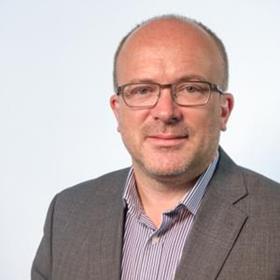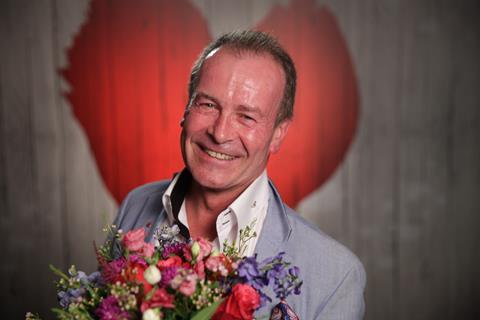In the first of a regular series of interviews with the technology leaders of leading broadcasters and platforms, John Maxwell Hobbs speaks with RTÉ’s Richard Waghorn about technology transformation and the challenges faced by public service broadcasters.
Richard Waghorn has a somewhat atypical background for a CTO. He holds an MBA in Business Management as well as a BA in Public Media and Geography. He began his broadcasting career in 1994 at the BBC on the editorial side as a presentation assistant for Radio 4, where he was responsible for writing scripts and trails. Following that he moved to commercial radio when he went to work for the Essex Radio Group as Development Manager at Southend on Sea.

“It was an eye-opening experience - the MD got me involved in everything,” he says. “I was involved in marketing, running the charity, doing audience research.
“It was a good opportunity to learn a huge amount about the radio business. When I returned to take on a strategy role at the BBC, I felt that really knew what the radio business was about. I was well rounded.”
His return to the BBC in 1998 saw him move from an initial role as a Business Analyst in the Strategy and Development organisation to roles in New Media, and the Distribution where he worked as the Project Manager for the launch of Freeview, the UK’s DTV service. This led to his appointment as the BBC’s Controller of Distribution in 2005.
During his four years in that role, his primary focus was the BBC’s readiness for the UK’s switchover to digital transmission. That initiative involved his oversight of the rolling out of multiplexes and negotiating the BBC’s deal with Digital UK. He also oversaw the successful launch of Freesat, the BBC-led free-to-air satellite television service. During his tenure, he served on the board of several industry bodies, including the Digital TV Group, and Freesat Ltd.
“I’m not a typical CTO – I don’t have a background in technology. I’m a CTO that can focus on strategy and how to make your business more efficient and effective.”
In 2009, Waghorn moved from the BBC to become the CTO of the South African Broadcasting Corporation (SABC). In his two years at SABC, he led the technology and operations business providing leadership to 900 staff in the television facilities, radio facilities, outside broadcast, engineering, distribution and IT business units. While there, he implemented strategies for digital transformation and developed the broadcaster’s strategy for digital switchover.
The move to RTÉ
Waghorn’s role as Director of Transformation and Technology incorporates his previous role of CTO for the broadcaster, a role he has held for six years now. He runs the technology business, setting the strategy and directing and controlling the delivery of technology solutions, services and infrastructure and is the product owner of the free-to-air digital terrestrial television platform Saorview and the IP-TV service Saorview Connect.
“Compared to SABC, the role at RTÉ is more of a strategic role and project focussed,” says Waghorn. “And I’m not a typical CTO – I don’t have a background in technology. I’m a CTO that can focus on strategy and how to make your business more efficient and effective. However, technology is a part of everything we do. In 1998, the strategic work we did at the BBC focused on how we would deal with digital. A lot of the strategy work had technology at the core.”
RTÉ explained
Raidió Teilifís Éireann, or RTÉ, is the public service broadcaster for the Republic of Ireland. In operation since 1926, it is funded by both a license fee and advertising, it operates radio, television, and online services, as well as supporting two orchestras and three choirs.
He credits his early days in radio as a major asset in dealing with the various divisions at RTÉ, particularly operations and editorial. “Having made radio programmes, you understand what the challenges are on the frontline. You have an appreciation for what they have to work with,” he says. “Some technology people can come into a broadcaster and spend their entire career without ever entering a studio. With my radio experience, I feel quite connected with the business.”
Day to Day
Waghorn describes a typical day has having a lot of variety. “It’s a mix of working closely with my leadership team, resolving issues, elements of strategy, a huge amount of work going into managing relationships with other people across the business, particularly finance, operations, and news,” he says. “Over the course of a week, there are all the approval processes – capital board meetings, approval board meetings. And there is also the new product, Saorview and dealing with the operational and marketing parts of that.”

Waghorn oversees several teams – Tech Infrastructure, Applications and Systems (business and broadcast systems), Project Management Office, Solutions Team, Operations (help desk, LAN and WAN), and Architecture. “I’ve got a wide range of people on my teams – people from an IT background, people from a financial background, some pure project managers,” he says.
Transformation
He is also leading the overall transformation programme across the entire organisation, working closely with HR and RTÉ’s Director General. “I am working closely with HR and some of the other divisions on how they can transform the way they work. To make sure we’re renewing RTE for the next generation,” he says.
The transformation strategy, which was just announced, is built around six themes: Working together, Leading the way, Creating. Smarter,. Defining teams, Renewing our tech, and Building our future.
Waghorn is clearly enthused. “This is an exciting strategy with the audience at the heart. The organisation is transforming itself to address the challenges, and to be here for future generations.” He identifies the key challenges as: Changes in audience behaviour, Technology and new ways of accessing content, and securing funding for public service broadcasters.
Industry view: The challenges
Looking beyond RTÉ, Waghorn has identified a number of common challenges facing broadcasters today. “With public service broadcasters, funding is the biggest challenge,” he says. “Also dealing with legacy infrastructure and environments. We can’t be as fleet of foot as someone like Netflix and Google. “For broadcasting in general,” he adds, “It’s addressing the changing of audience behaviour and attracting younger audiences to broadcasting.”
Waghorn acknowledges that sometimes the job can be tough. “When we’ve had an outage or some sort of crisis management, for example. I’m pleased to say we don’t have many of those,” he says.
“RTE has funding challenges like most PSBs – we’ve had a constrained technology investment budget for about six years,” he explains. We have had to make the money work hard as we are in the process of making the transition to HD and the cloud, among other thinks. We have to think very carefully about what we’re spending our money on. And in everything we do, we have to protect the output.”
“There are some areas of our environment have still not been addressed and if we have a failure, it would cause a major headache,” he continues. “We know where those areas are, and are working to mitigate against those risks.”
He sees progress, however. “A couple of years back, we did have outages due to aging equipment,” says Waghorn.
“We have to address it and challenging the way we have done things – not just simply replacing a piece of kit.”
The organisation has recently made a transition to a private cloud infrastructure, called Nebula.
“We had a very distributed technical architecture in the past. Two years ago we began making plans for Nebula. It’s been running for a year now – the vast majority of our applications are now running on it. The performance has exceeded our and some of our users’ expectations as well.”
He describes the organisation’s technology strategy as one of careful deliberation. “We don’t have the luxury of money to waste, so we have to work at being a very smart follower of the curve – we don’t have to lead the way,” he says. “We’ve watched the market closely, and given a lot of thought and consideration to what we’re going to do. That’s our strategy at the moment – really think through the investments we make.”
“We had some bad days when I first started, but we have reduced those bad days by trying to work smarter, and efficiently and that’s reduced a lot of the headaches for us,” says Waghorn.
When asked to describe what gets him up in the morning, Waghorn jokes, “ It’s certainly not the dark winter days here in Dublin.
“It’s the fact that we’ve made a number of changes here, and I’ve seen the positive outcome of those changes. I want to keep making those changes for lasting benefit for RTE. I’ve changed the way I interact with the team and now have a very motivated team who are inspired to do their best and grow. I find that very rewarding. When you get that back from people, it makes you want to do more. I consider myself very lucky that I’ve got a highly-motivated team, they know what we want to achieve, and we have some fun doing it.”
























No comments yet